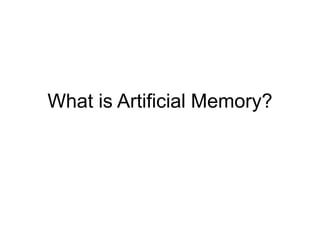What is Artificial Memory?
•
2 gefällt mir•4,687 views
Short introduction to the idea artificial memory idea.
Melden
Teilen
Melden
Teilen

Empfohlen
Weitere ähnliche Inhalte
Ähnlich wie What is Artificial Memory?
Ähnlich wie What is Artificial Memory? (20)
Does the Internet Make You DumberThe cognitive effects are measurab.docx

Does the Internet Make You DumberThe cognitive effects are measurab.docx
Papert, Seymour (1980). MINDSTORMS. Children, Computers and Powerful Ideas.

Papert, Seymour (1980). MINDSTORMS. Children, Computers and Powerful Ideas.
Xenophilia: how a love of difference is essential in making connections

Xenophilia: how a love of difference is essential in making connections
KCB201 Week 1 Lecture: Information, Knowledge, Community?

KCB201 Week 1 Lecture: Information, Knowledge, Community?
What is Artificial Memory?
- 1. What is Artificial Memory?
- 2. People store things in their brains, one by one, as they perceive them!
- 3. In thought and memory, however, knowledge is organized into a network of associations.
- 4. Trying to express this network of thoughts and ideas is difficult as one is limited to serial speech and script!
- 5. Moreover, expressing networked knowledge into serial strings tends to create inefficient repetitions: „Heidegger and Husserl met first in Heidelberg.“ „Heidelberg , where Heidegger and Husserl first met.“
- 6. bla bla bla bla … Repetition due to serialization makes communication inefficient.
- 7. bla bla bla bla … Until now, communication was more or less limited to serial language: speech and text/documents. .
- 8. bla bla bla bla … However, in most cases, the left person does not know what the right person knows, so that there is another form of creating inefficiency: repeating what is already known.
- 9. bla bla bla bla … Even search engines cannot solve these problems of inefficient communication: We‘ll always end up with text/documents repeating information and knowledge.
- 10. Wouldn‘t life be a lot easier if one didn‘t have to repeat oneself? And if we didn‘t have to hear and read what we already know?
- 11. That‘s where the artificial memory idea kicks in. If people had external copies of their networked knowledge, they could share and relate them.
- 12. Following our own thoughts, instead of simply listening or reading what others have to say, we could then easily extend our knowledge to what other know additionally. Thus the efficiency of communication and learning Could be increased considerably.
- 13. This thought-accompanying artificial memory extension would not be limited to only one person. We could take in information new to us from many people at the same time, as networked knowledge can be aggregated. Communication and information would be off the hook of individual textual expressions.
- 14. Not to talk about the advantage of artificially remembering knowledge if our own memory fails or needs some clues.
- 15. Well, now the secret and challenge is to create an artificial memory that is efficient to use. And that‘s what this sofware – ArtificialMemory – is all about: Revolutionizing the way we communicate, learn and think.